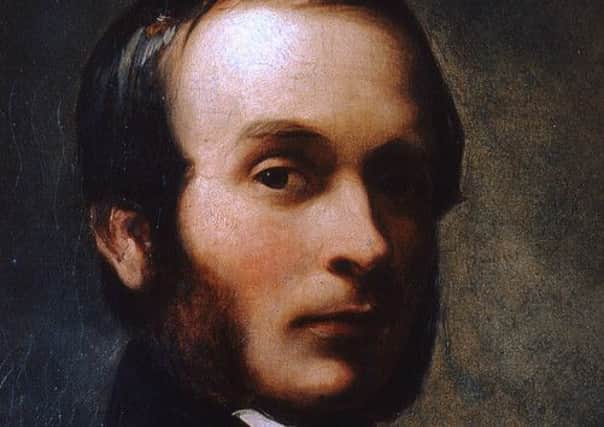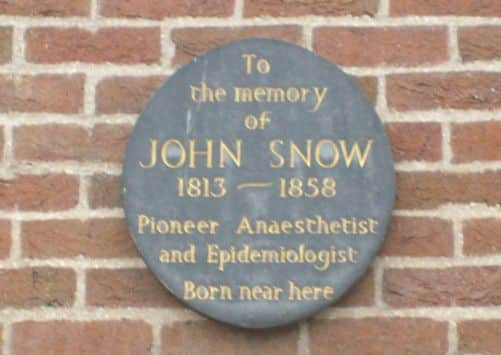Unsung in his own land, John Snow is a hero who saved countless lives


TWO hundred years ago on March 15, a boy was born in York, the eldest of a family of nine that would arrive for parents William and Frances Snow. They lived in North Street, which was one of the poorest areas of the city, and prone to flooding due to its closeness to the River Ouse.
William was an unskilled labourer working in the local coalyards. Little John was baptised at All Saints Anglican Church on North Street.
Advertisement
Hide AdAdvertisement
Hide AdIn the early 1800s the poorest parts of all towns and cities were overcrowded and filthy. York was no different to the rest, and the average life expectancy was 29. Many children died in infancy.


John Snow’s family were later able to move to less desperate conditions, and clearly there was something about his hardworking parents that meant they had their sights on a much better life for their children. Two of their daughters would, despite the lack of education for most ordinary children (especially girls) become headmistresses, and John would rise from his humble beginnings to be one of the leading doctors in the country.
Not only that – John Snow was to become a leader in two fields, with work including studies that found dirty water to be the cause of diseases including cholera which killed millions of people. His discoveries led directly to the eradication of cholera in Britain and many other places around the world.
To doctors, and particularly specialists in public health and epidemiology (the study of the patterns, causes, and effects of health and disease conditions in defined populations) his status is god-like. In the field of anaesthetics he is also seen as a hero because he was one of the first physicians to study and calculate dosages of ether and chloroform for use during surgery.
Advertisement
Hide AdAdvertisement
Hide AdIn scientific circles he is given due praise, and in London where he practised medicine and carried out research, there are public monuments to John Snow. But his contribution to medicine and to vast improvements in public health should be more widely known and celebrated, say his fans.
A blue plaque on the Park Inn Hotel in North Street marks the place of Snow’s birth, says Professor Karl Atkin, a medical sociologist at York University and an expert on Snow who will be speaking at a one-day conference, The Legacy of John Snow. It will mark the 200 anniversary of the great man’s birth on that very day, March 15 at The Park Inn.
One of the aspects of the great man’s life that should be celebrated is the ambition and determination of his parents to see their children do well despite their lowly start in life, says the professor.
“The information about his early life is sketchy, and what we know is largely put together from census data, but his father seems to have been a hustler who got his children educated via the ‘ragged schools’ set up by philanthropists. Later he found his bright boy John an apprenticeship with a surgeon in Newcastle who was doctor to George Stephenson. He subsequently worked in County Durham and Pateley Bridge before going to medical school in London.”
Advertisement
Hide AdAdvertisement
Hide AdIn 1837 Snow began working at the Westminster Hospital and was admitted as a member of the Royal College of Surgeons in 1838. He was admitted to the Royal College of Physicians in 1850.
“He was one of the first physicians to realise that it was not a good thing to simply soak a cloth in chloroform, place it over a patient’s face and hope for the best. He carried out experiments with anaesthetics in his own kitchen and arrived at dosages that were suitable for different sizes of people, often doing tests on himself,” says Prof Atkin.
“It was a time when things were rapidly changing in medicine, and Snow published lots of papers about his work in The Lancet, as well as being a prolific speaker. This was considered ungentlemanly by the medical establishment – a bit too much like blowing your own trumpet. No doubt there was snobbery about Snow based on his lowly origins.”
A few noses more might have been put out of joint when, in 1853 and 1857, Queen Victoria herself requested that the good doctor was called in to administer chloroform to her for the birth of Leopold and Beatrice, the last two of her nine children. This led to wider acceptance of obstetric anaesthesia.
Advertisement
Hide AdAdvertisement
Hide AdWhat brought John Snow into greatest conflict with the medical world, causing to him to be for many years virtually a lone voice in the wilderness on the issue, was the theory that killer diseases such as cholera were caused by air pollution or “bad air”, as it was then called.
In the age before the concept of ‘germs’ was known and understood, this ‘miasma’ theory prevailed. Early on Snow himself did not understand what was the true mechanism for the transmission of diseases, but his observations in the poorest and most cholera-ridden areas of London ruled miasma idea. Before he pinpointed water as the carrier of disease, he was already clear that it was extremely unlikely that illnesses of the stomach could be carried in the air and transmitted to the gut via the lungs.
“He did two crucial experiments,” says Prof Atkin. “The people of London were served by different water companies taking water from different parts of the Thames. He compared the incidence of illness in areas served by these companies, some of whom took dirtier water from lower down the Thames, and others taking water that was comparatively clean from further upstream.
“Those populations drinking water taken from higher up the river had lower levels of cholera. He was able to relate cholera to a particular water pump, and that was why he famously broke the handle off the Broad Street Pump to stop local people drinking the dirty water.”
Advertisement
Hide AdAdvertisement
Hide AdSnow worked and took notes obsessively and worked hard to convince the medical world of his discovery, but it took many years for his peers to accept a new theory when they were convinced they already had the answer.
“He had an uphill struggle, and many were not convinced by his ideas until after his death of a stroke at 45, by which time some others were doing similar studies, but he never got proper acknowledgement in his lifetime. However his efforts led to water companies separating drinking water from sewage and pumping stations were moved up river. Thanks to Snow, Britain has not suffered a cholera outbreak since 1854.”
Snow was a fascinating character in other ways – he never married or had children, was teetotal and vegetarian for most of his adult life. Devotees of John Snow say one of the most admirable characteristics of the man is that he never, unlike almost all of the medical and political world of the time, blamed the working class’s ‘fecklessness’ for the disease and poverty they suffered. Snow also conceived of the novel idea that if you want to know about people’s health you talk to them about their lives.
Professor Hilary Graham, professor of health sciences at York University and organiser of the John Snow conference, says: “It’s hard to understand, but Snow is one of those brilliant people who has affected everyone’s life yet he is a prophet never celebrated in his own land. Apart from a blue plaque, York has never before celebrated him, which is why we felt we should do this. I don’t know anyone who wouldn’t be proud to know he was from the city.
Advertisement
Hide AdAdvertisement
Hide Ad“Our civic traditions mean we are very good at celebrating battles and kings found under car parks, but John Snow’s contribution was felt around the world. I think one day is a small contribution to make to public acknowledgement of his tremendous achievements.”
The 200th anniversary one-day conference The Legacy of John Snow is aimed at the general public and is free to attend but you need a ticket. It will be held on Friday, March 15 at the Park Inn Hotel, North Street, York, YO1 6JF. Further information: 01904 321645 or go to: www.york.ac.uk/healthsciences/john-snow-event/ For free tickets go to: www.york.ac.uk/news-and-events/events/public-lectures/tickets/
Marking great man’s work
In York, a blue plaque can be seen on the west end of the Park Inn Hotel in North Street, built on the spot where John Snow was born and grew up.
A plaque commemorates Snow and his 1854 study in the place of the water pump on Broad Street (now Broadwick Street). The spot where the pump stood is covered with red granite.
Advertisement
Hide AdAdvertisement
Hide AdA public house nearby was named The John Snow in his honour.
His grave in Brompton Cemetery, London, is marked by a funerary monument.
In 2003, a poll of British doctors ranked Snow as the greatest physician of all time.
John Snow College was founded in 2001 on Durham University’s Queen’s Campus in Stockton-on-Tees.